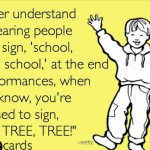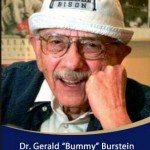Who is credited with introducing American Deaf culture to the practice of “hand
waving” for applause?
a. Laurent Clerc
b. Thomas Hopkins Gallaudet
c. Gerald “Bummy” Burstein
d. Frederick Schreiber
Not sure?
Answer: “c” – Gerald “Bummy” Burstein
The modern American Deaf culture practice of twisting the hands in the air evidently came to the U.S. from France in late 1985. In a magazine article, Gerald “Bummy” Burstein told of attending the 200th anniversary birthday celebrations for Laurent Clerc in France that November. Just prior to that, he attended the French Deaf people’s national convention, and noticed that each presentation ended with “clapping” made by twisting the arms and hands above the heads. Impressed by this display of visual applause – which also followed his own presentation – he told the story the following summer to participants in the 1986 Deaf Youth Leadership Camp in Minnesota. The campers and staff immediately picked up the French deaf applause and continued to use it themselves for the rest of the camp session. It spread throughout American Deaf Culture like a virus from there, and became especially prominent during the 1988 Gallaudet “Deaf President Now” protest and the 1989 “Deaf Way” international conference.
Born in Brooklyn, NY, Gerald Burstein is known as “Bummy” for his beloved love for the Brooklyn Dodgers. He obtained a Bachelor’s degree from Gallaudet University and a Master’s degree from CSUN. In October 1986, he received an Honorary Doctor of Laws Degree from Gallaudet University. He has served 30 years on the board of the Gallaudet University Alumni Association – – 13 years as president.
“Bummy” is a Certified Professional Parliamentarian with the American Institute of Parliamentarians and a member of the National Association of Parliamentarians. He has presented over 200 parliamentary workshops all over the nation including Hawaii and Canada to student groups, local, state, and national conferences, and many other places. He, also, has served as a parliamentarian at many conferences and meetings. He received many honors and awards.
In 1991, he was named recipient of the prestigious International Platform Association Award for “… popularizing parliamentary procedure.” He is the only known deaf person to be honored by this 182-year old international organization which also recognized the contributions of John F. Kennedy, Bob Hope, Nanette Fabray and others. “Bummy” also received from CSUN, The National Center on Deafness, “Distinguished Alumni” award in 2006. In 1986, while serving as president of the Gallaudet University Alumni Association, GUAA, he wrote a 11-page booklet, “The Basics of Parliamentary Procedure” written especially for Deaf and Hard of Hearing students. It is a simple, easy to understand, primer on how to run meetings which GUAA printed and distributed 10,000 copies as a public service to schools and organizations. The booklets have been used in Singapore, Columbia, and Tibet. The second book, 94 pages, “Bummy’s Successful Meeting Procedures,” A Parliamentarian’s Basic Guide, was printed. He also produced a 90-minute, voice-over and captioned, videotape: “Bummy’s Basic Parliamentary Workshop.” The Gerald “Bummy” Burstein. ’50, Endowed Chair in Leadership, at Gallaudet University, is the first chair to be fully endowed established by a deaf alumnus.
Bummy Burstein is well known in the Deaf community for his humor, his knowledge and his sparkling personality. He is also known for his passion for “the Parliamentary Procedure” and running meetings according to Roberts Rules of Order.
References: ohsoez.com and gallaudet.edu.
Bummy now resides in the beautiful state of California and continues to remain active in Deaf events whenever possible.
And now you know the rest of the story…………………………














September 20, 2015 at 7:44 pm
How interesting! In all my years of studying ASL, I never had any idea the history behind the applause. I’ve had several people ask me about it. Thank you for sharing!
August 11, 2017 at 5:11 am
Signed applause has a practical purpose as well. When audience members are applauding in the usual hearing manner, the Deaf person on stage can observe people in the first three or four rows making the applause movement. In successive rows beyond that point, especially in a raked house, observing the physical applause movement quickly becomes impossible; what the folks in the balcony are doing is always unknown. But if most or all people in the house sign applause, then the Deaf person on stage instantly knows how much applause he or she is getting; the body language of folks as they are signing it also reveals how enthusiastic the reaction is.